Ernest Hemingway, fresh off his marriage to Hadley Richardson, his first wife, arrived in Paris in 1921. Paris was a playground for writers and artists, offering respite from the radical politics spreading across Europe. Sherwood Anderson supplied Hemingway with a letter of introduction to Ezra Pound. The two litterateurs met at Sylvia Beach’s bookshop and struck up a friendship that would shape the world of letters.
They frolicked the streets of Paris as bohemians, joined by rambunctious and disillusioned painters, aesthetes, druggies, and drinkers. They smoked opium, inhabited salons, and delighted in casual soirées, fine champagnes, expensive caviars, and robust conversations about art, literature, and the avant-garde. Pound was, through 1923, exuberant, having fallen for Olga Rudge, his soon-to-be mistress, a young concert violinist with firm breasts, shapely curves, midnight hair, and long eyebrows and eyelashes. She exuded a kind of mystical sensuality unique among eccentric highbrow musicians; Pound found her irresistible.
Pound was known for his loyalty to friends. Although he had many companions besides Hemingway—among them William Butler Yeats, James Joyce, T.S. Eliot, Marianne Moore, Robert McAlmon, Gertrude Stein, e.e. cummings, Pablo Picasso, Wyndham Lewis, T.E. Hulme, William Carlos Williams, Walter Morse Rummel, Ford Madox Ford, Jean Cocteau, and Malcolm Cowley—Hemingway arguably did more than the others to reciprocate Pound’s favors, at least during the Paris years when he promoted Pound as Pound promoted others.
Pound was aware of Hemingway’s talent for publicity: he and Hemingway had combined their genius to promote Eliot’s The Waste Land. Hemingway introduced Pound to William Bird, an American reporter who arranged to publish an autobiographical piece about Pound’s childhood. Bird was instrumental to the eventual publication of Pound’s A Draft of XVI Cantos. Pound, for his part, secured for Hemingway a position as assistant editor of The Transatlantic Review. Their relationship matured into something symbiotic and mutually beneficial.
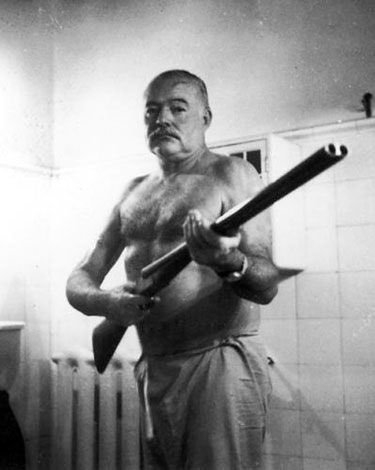
Pound edited Hemingway’s work, stripping his prose of excessive adjectives. Hemingway remarked that Pound had taught him “to distrust adjectives as I would later learn to distrust certain people in certain situations.” Unlike, say, Conrad Aiken or Robert Frost, who resisted Pound’s editing, Hemingway acquiesced to Pound’s revisions. In exchange, Hemingway taught Pound how to box. He acknowledged that the scraggly Pound had “developed a terrific wallop” and had “come along to beat the hell wit the gloves.” Hemingway worried that “I will get careless and [Pound] will knock me for a row of latrines.” He even treated Pound to a night at the prizefights to brighten Pound’s spirits as Pound battled various illnesses.
Pound, however, grew disillusioned with Paris, where his friends were gravitating toward socialism and communism. Paris, he decided, was not good for his waning health. Hemingway himself had been in and out of Paris, settling for a short time in Toronto. In 1923, accompanied by their wives, Pound and Hemingway undertook a walking tour of Italy. The fond memories of this rejuvenating getaway inspired Pound to return to Italy with his wife Dorothy Shakespear in 1924. They relocated, in 1925, to a picturesque hotel in Rapallo, a beautiful sea town in the province of Genoa, on the bright blue Tigullio Gulf.
Pound found the weather in Rapallo to be soothing and agreeable. It was Hemingway who had first recommended this scenic spot, having visited Sir Max Beerbohm there years before. Hemingway’s tales of the sunshine, swimming, tennis, and other outdoor activity in Rapallo appealed to Pound, who fancied himself an athlete. The fact that his mistress Olga frequented Italy—where her father owned a house—made Rapallo all the more desirable, as did Dorothy’s seeming willingness to share her husband with his lover.
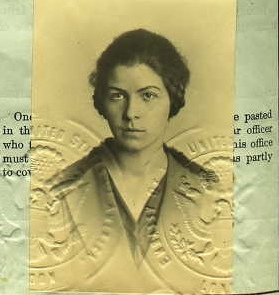
Olga Rudge
The friendship remained intact as Pound settled into Rapallo. About to vacate Europe for Key West, Hemingway dashed off a missive to Pound that began “Dear Duce” and then boasted about how Papa, as people had begun to call Hemingway, was “going to know everything about fucking and fighting and eating and drinking and begging and stealing and living and dying.” Gradually, though, the Pound-Papa gulf widened.
The move to Italy also effectively terminated Pound’s glory years in Paris, about which Hemingway wrote affectionately:
So far we have Pound the major poet devoting, say, one fifth of his time to poetry. With the rest of his time he tries to advance the fortunes, both material and artistic, of his friends. He defends them when they are attacked, he gets them into magazines and out of jail. He loans them money. He sells their pictures. He arranges concerts for them. He writes articles about them. He introduces them to wealthy women. He gets publishers to take their books. He sits up all night with them when they claim to be dying and he witnesses their wills. He advances them hospital expenses and persuades them from suicide. And in the end a few of them refrain from knifing him at the first opportunity.
This last line is both teasing and fitting because there was, in fact, at least one assailant in Paris who didn’t refrain: a man who attempted to stab Pound at a dinner party hosted by the surrealists.
Hemingway guessed that Pound might stay in Italy “sometime” even if he took “no interest in Italian politics.” Hemingway was right about Pound’s love for Rapallo but wrong about his political affinities. More than anything else, Italian politics—and the rise of fascism—damaged Hemingway’s regard for Pound, who became a zealous supporter of Mussolini and a reckless trafficker in conspiracy theories.
Hemingway grumbled that if Pound “actually and honest to God … admire[d] and respect[ed] … [Mussolini] and his works [then] all I can say is SHIT.” Hemingway, true to character, remained manfully playful, stating, “I will take practical steps by denouncing you here in Paris as a dangerous anti-fascist and we can amuse one another by counting the hours before you get beaten up in spite of your probity—which in such a fine country as it must be would undoubtedly save you.” Such slight criticisms may have been colored with a lighthearted tone, but the disapproval was plain.
When Hemingway and Guy Hickock visited Pound in northern Italy in 1927, Pound was living in self-imposed exile. Hemingway had recently converted to Catholicism and was enjoying renewed fame after the publication of The Sun Also Rises. He divorced and remarried that year, offering Hadley a portion of the profit from The Sun Also Rises as part of their divorce. Pound, meanwhile, was immersing himself in political theories that likely baffled Hemingway as much as they angered him.
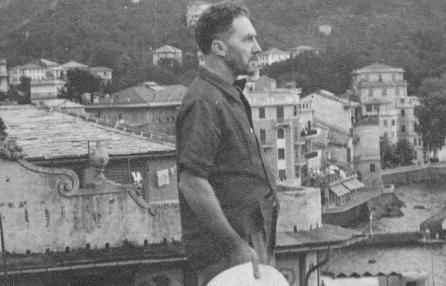
Shortly after the stock-market crash in 1929 and the onset of a worldwide economic crisis, Pound took to writing in Italian. Mussolini’s March on Rome had occurred seven years earlier, and since then he had assumed dictatorial control of Italy, suppressed opposition parties, and built a police state. Pound was enthralled. He met Mussolini in 1933, peddling strange monetary schemes to the fascist leader.
In 1933 Pound and Hemingway exchanged letters that highlighted their diverging attitudes toward Mussolini, fascism, and government. Pound, who’d embraced wild and polemical speculations about the economic theories of the American Founders—Jefferson in particular—began to decry capitalism and taxation while celebrating fiat currency and a convoluted system of state central planning. “Since when are you an economist, pal?” Hemingway mocked. “The last I knew you you were a fuckin’ bassoon player.” Hemingway offered Pound some money, sensing that money was needed, but Pound declined it.
Pound was now enamored with Il Duce; Hemingway was furious. Hemingway hated government, he told Pound, and preferred organized anarchism and masculine sport to statist ideology. Hemingway saw through Pound’s charlatanic flourishes and economic fallacies and accused Pound, quite rightly, of lacking clarity. Yet Pound’s admiration for Hemingway’s work did not diminish, and Pound, ever devoted, included Hemingway in an anthology that he was then editing.
Possibly the last time Pound and Hemingway saw each other, they were having dinner with Joyce on a warm summer night in Paris. Pound allegedly bloviated about economics and the decline of art and European civilization, and Hemingway and Joyce feared that Pound had gone mad. The date and details of the dinner are a matter of debate, as is the veracity of any account of that evening. But one thing is certain: Hemingway was frustrated with Pound’s embrace of Italian fascism. By the time Pound voiced support for Franco in the Spanish Civil War, putting him once again at odds with Hemingway, their once thriving friendship had deteriorated beyond repair.
The falling out was no secret, and other writers took sides. William Carlos Williams wrote to Pound in 1938, saying, “It is you, not Hemingway, in this case who is playing directly into the hands of the International Bankers.” Hemingway conveyed his concerns about Pound to their friend Archibald MacLeish:
Thanks for sending the stats of Ezra’s rantings. He is obviously crazy. I think you might prove he was crazy as far back as the latter Cantos. He deserves punishment and disgrace but what he really deserves most is ridicule. He should not be hanged and he should not be made a martyr of. He has a long history of generosity and unselfish aid to other artists and he is one of the greatest living poets. It is impossible to believe that anyone in his right mind could utter the vile, absolutely idiotic drivel he has broadcast. His friends who knew him and who watched the warpeing [sic] and twisting and decay of his mind and his judgement [sic] should defend him and explain him on that basis. It will be a completely unpopular but an absolutely necessary thing to do. I have had no correspondence with him for ten years and the last time I saw him was in 1933 when Joyce asked me to come to make it easier haveing [sic] Ezra at his house. Ezra was moderately whacky then. The broadcasts are absolutely balmy. I wish we could talk the whole damned thing over. But you can count on me for anything an honest man should do.
Hemingway was referring to Pound’s notoriety as a propagandist for radio and newspaper during the Second World War. When he received transcripts of Pound’s radio broadcasts, he surmised that Pound was “obviously crazy” for espousing such “vile, absolutely idiotic drivel.” Pound was a “crazy … and harmless traitor,” Hemingway concluded, and an “idiot” with a “distracted mind” who “ought to go to the loony bin.” And that’s precisely where Pound ended up: He was admitted to St. Elizabeth’s Hospital in Washington, DC, in 1945.
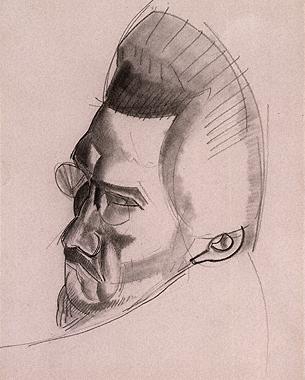
Pound’s friends put their reputations at stake to help him. MacLeish, expressing both love and admonition, dashed off these words in a missive to Pound:
… your information is all second-hand and distorted. You saw nothing with your own eyes. And what you did see—Fascism and Nazism—you didn’t understand: you thought Musso belonged in Jefferson’s tradition and God knows where you thought Hitler belonged. I think your views of the history of our time are just about as wrong as views can be. But I won’t sit by and see you held in confinement because of your views. Which is what is really happening now. I am doing what I am doing partly because I revere you as a poet and partly because I love this Republic and can’t be quiet when it violates its own convictions.
MacLeish helped to orchestrate Pound’s release from St. Elizabeth’s, drafting a letter to the government on Pound’s behalf that included Hemingway’s signature, along with those of Robert Frost and T.S. Eliot. A year later Hemingway provided a statement of support for Pound to be used in a court hearing regarding the dismissal of an indictment against Pound.
Hemingway, who was now living in Cuba, did little else to help Pound. More for practical reasons than personal conviction, Hemingway, who was himself targeted by the American government, refused to sign a petition of amnesty for Pound. The petition had been Olga’s idea, and Hemingway didn’t believe the American people would rally behind the desperate pleas of an adulterous lover. Hemingway never visited Pound at St. Elizabeth’s, but he did tell Pound, via Dorothy, that he had read and enjoyed The Pisan Cantos. And when he won the Nobel Prize in 1954, Hemingway announced that the year was good for releasing poets, a not-so-slight reference to his old friend.
Hemingway awoke on the morning of July 2, 1961, put a 12-gauge, double-barreled shotgun to his head, and, alone in the foyer of his home, blew his brains out. He was 61. Pound’s friends and family didn’t tell him about Hemingway’s death, but a careless nurse did, and Pound reacted hysterically. The older of the two, Pound, at 72, was free from St. Elizabeth’s, where he’d spent 12 solemn years. He had returned to his beloved Italy to finish out his long and full life. In the autumn of 1972, he died peacefully in his sleep in Venice, the day after his birthday, which he’d spent in the company of friends.
Allen Mendenhall is an associate dean at Faulkner University Thomas Goode Jones School of Law and executive director of the Blackstone & Burke Center for Law & Liberty.
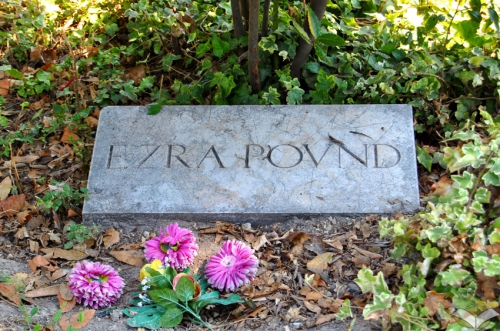



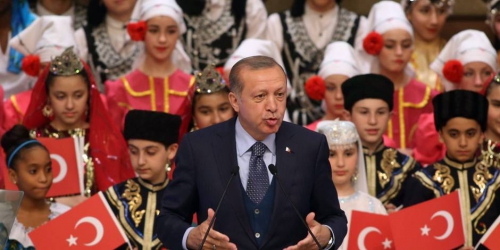

 del.icio.us
del.icio.us
 Digg
Digg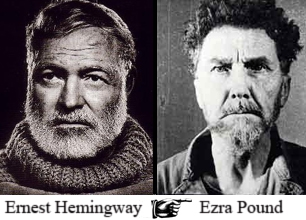

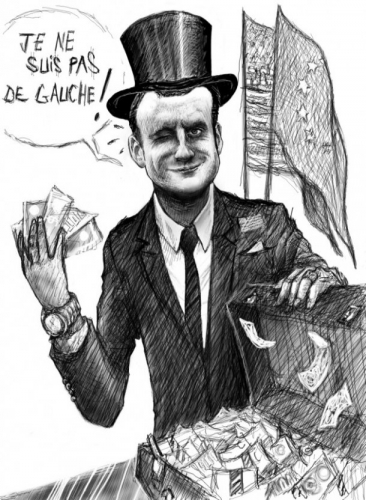
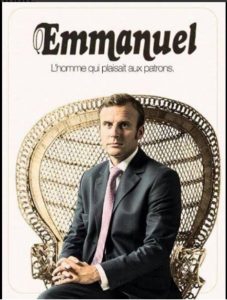 Ainsi avons-nous de ces contradictions presque immédiates, y compris dans le propos et assumées comme telles, qui rendent compte de cette cohabitation du dérisoire et du tragique. Sans en rendre compte par la logique précise de son analyse le commentateur en rend compte effectivement en faisant défiler ces contradictions. Nous ignorons si cela est voulu, mais dans tous les cas cela a la vertu du vrai (d’une vérité-de-situation fondatrice du caractère tragédie-bouffe). Ainsi nous dit-il que les présidents changent et ne changent rien, parce que « la France ne se gouverne plus elle-même », qu’il y a l’Europe qui donne ses consignes et la “mondialisation” (le globalisation) qui fait que « la terre ne tourne plus que dans un sens », celui du « cartel des banques » ; puis il enchaîne aussitôt par la proposition de bon aloi mais tout de même assez paradoxale « Voilà pourquoi il importait que soient débattus durant la campagne présidentielle tous ces thèmes mondialisés... », pour aussitôt émettre la réserve évidente qui explique tout : « Mais ceux-ci ont été à peine évoqués. Peut-être est-ce à cause d’un sentiment d’impuissance face à ces problèmes. »
Ainsi avons-nous de ces contradictions presque immédiates, y compris dans le propos et assumées comme telles, qui rendent compte de cette cohabitation du dérisoire et du tragique. Sans en rendre compte par la logique précise de son analyse le commentateur en rend compte effectivement en faisant défiler ces contradictions. Nous ignorons si cela est voulu, mais dans tous les cas cela a la vertu du vrai (d’une vérité-de-situation fondatrice du caractère tragédie-bouffe). Ainsi nous dit-il que les présidents changent et ne changent rien, parce que « la France ne se gouverne plus elle-même », qu’il y a l’Europe qui donne ses consignes et la “mondialisation” (le globalisation) qui fait que « la terre ne tourne plus que dans un sens », celui du « cartel des banques » ; puis il enchaîne aussitôt par la proposition de bon aloi mais tout de même assez paradoxale « Voilà pourquoi il importait que soient débattus durant la campagne présidentielle tous ces thèmes mondialisés... », pour aussitôt émettre la réserve évidente qui explique tout : « Mais ceux-ci ont été à peine évoqués. Peut-être est-ce à cause d’un sentiment d’impuissance face à ces problèmes. » Le reste était une simple formalité: il suffisait juste d’éliminer les autres candidats. On en a mis beaucoup sur la ligne de départ, désespérant le peuple en lui donnant l’image de la déplorable division dans laquelle les partis politiques ont entrainé le pays. Puis on a promis des primaires pour remédier à ça: il y aura un tri impitoyable! En effet: les candidats sérieux — Manuel Valls, Alain Juppé — ont été éliminés.
Le reste était une simple formalité: il suffisait juste d’éliminer les autres candidats. On en a mis beaucoup sur la ligne de départ, désespérant le peuple en lui donnant l’image de la déplorable division dans laquelle les partis politiques ont entrainé le pays. Puis on a promis des primaires pour remédier à ça: il y aura un tri impitoyable! En effet: les candidats sérieux — Manuel Valls, Alain Juppé — ont été éliminés.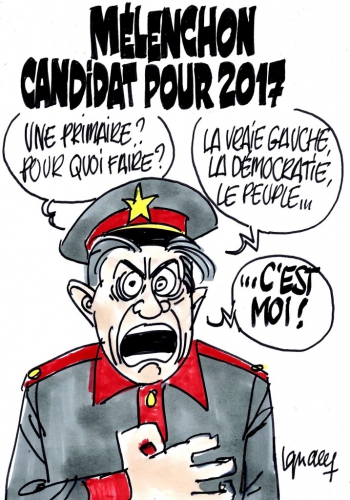

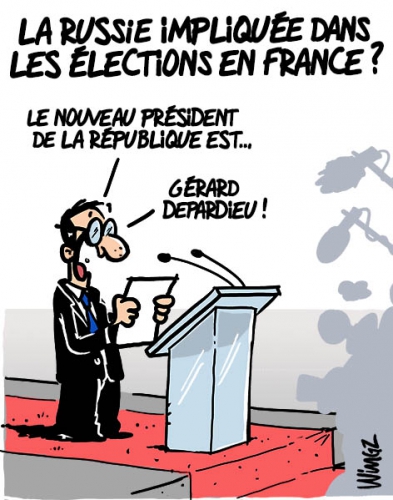
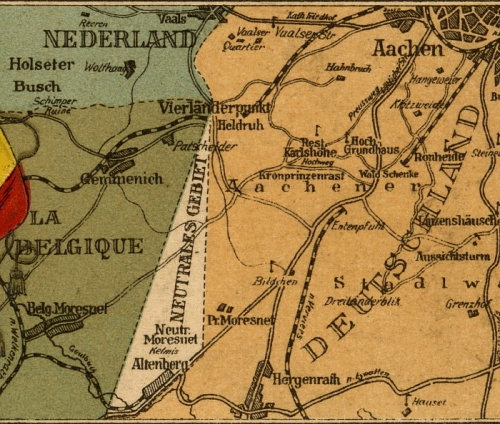
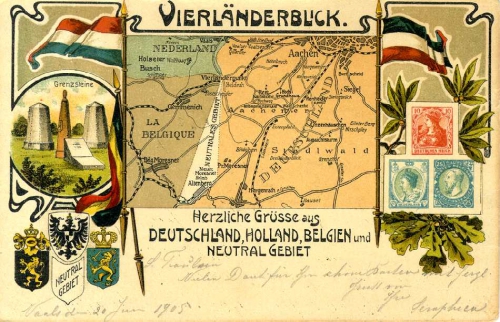
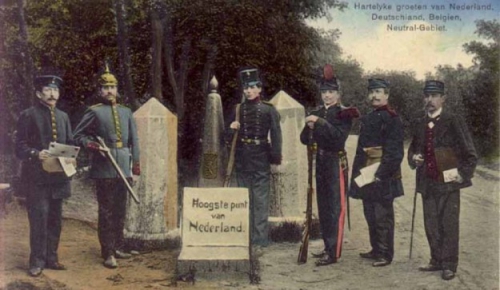
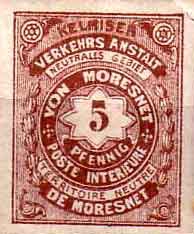 Neutral-Moresnet ne connaissait ni tribunal ni élections ni service militaire : pour autant, l’anarchie n’y régnait pas. L’ordre y était maintenu par des policiers belges et prussiens qui avaient l’autorisation, si cela s’avérait nécessaire, de franchir la frontière pour cueillir des délinquants. La Belgique et la Prusse se partageaient la masse fiscale. Il n’y avait aucune taxe sur les importations et les exportations, ce qui avantageait la contrebande. Le village disposait de trois gares : Hergenrath pour les grandes lignes qui reliaient Liège à l’Allemagne ; une gare cul-de-sac qui avait, elle, un statut de neutralité et qui s’étendait sur quelques centaines de mètres au-delà de la zone neutre ; enfin, une troisième gare en direction de Moresnet sur la ligne Tongres/Aix-la-Chapelle. L’entreprise qui donnait du travail était pour l’essentiel la société des mines. Elle ne négligeait pas le bien-être des travailleurs qui bénéficiaient de temps libres, largement encouragés. Des chœurs et des orchestres de mineurs furent créés ainsi que pas moins de sept associations de « Schützen », une société de pêcheurs et plusieurs sociétés de carnaval. La densité des bistrots y était inégalée. Quand éclate la première guerre mondiale, le petit territoire de Neutral-Moresnet est immédiatement occupé par les armées du Kaiser mais reste, du moins sur le plan formel, administré conjointement par les Belges et les Prussiens. Le Traité de Versailles donne le territoire à la Belgique et s’appelle désormais « Kelmis » (en allemand et en néerlandais) et « La Calamine » (en français). Il s’était appelé « Kalmis » jusqu’en 1972.
Neutral-Moresnet ne connaissait ni tribunal ni élections ni service militaire : pour autant, l’anarchie n’y régnait pas. L’ordre y était maintenu par des policiers belges et prussiens qui avaient l’autorisation, si cela s’avérait nécessaire, de franchir la frontière pour cueillir des délinquants. La Belgique et la Prusse se partageaient la masse fiscale. Il n’y avait aucune taxe sur les importations et les exportations, ce qui avantageait la contrebande. Le village disposait de trois gares : Hergenrath pour les grandes lignes qui reliaient Liège à l’Allemagne ; une gare cul-de-sac qui avait, elle, un statut de neutralité et qui s’étendait sur quelques centaines de mètres au-delà de la zone neutre ; enfin, une troisième gare en direction de Moresnet sur la ligne Tongres/Aix-la-Chapelle. L’entreprise qui donnait du travail était pour l’essentiel la société des mines. Elle ne négligeait pas le bien-être des travailleurs qui bénéficiaient de temps libres, largement encouragés. Des chœurs et des orchestres de mineurs furent créés ainsi que pas moins de sept associations de « Schützen », une société de pêcheurs et plusieurs sociétés de carnaval. La densité des bistrots y était inégalée. Quand éclate la première guerre mondiale, le petit territoire de Neutral-Moresnet est immédiatement occupé par les armées du Kaiser mais reste, du moins sur le plan formel, administré conjointement par les Belges et les Prussiens. Le Traité de Versailles donne le territoire à la Belgique et s’appelle désormais « Kelmis » (en allemand et en néerlandais) et « La Calamine » (en français). Il s’était appelé « Kalmis » jusqu’en 1972.
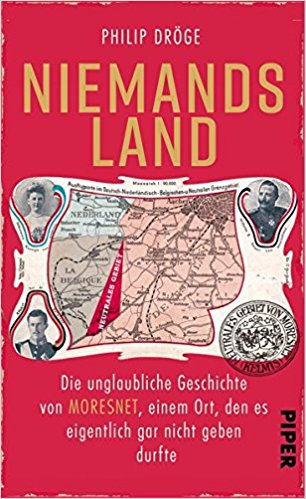 Ainsi arrive dans cet eldorado de la calamine une certaine Maria Rixen, servante allemande engrossé par son patron. Elle y cherche le bonheur, refuse l’exclusion qu’un siècle encore très pudibond inflige aux filles-mères en Prusse protestante. Elle accouche d’un garçon, confié, comme le veut l’époque, à une famille d’accueil : le petit Joseph Rixen est débaptisé dans la pratique car la maisonnée compte déjà un petit Joseph. On l’appelle Emile Pauly. Un gamin à double identité. En 1914, il devient allemand. En 1919, belge. En 1923, l’armée belge l’appelle comme conscrit. Il doit aller occuper la Ruhr. En 1940, il redevient allemand et est incorporé dans la Wehrmacht, encaserné dans la même caserne qu’il occupait à Krefeld sous l’uniforme belge. Il se sent belge, baptise son septième fils « Léopold », en l’honneur du roi. Il déserte mais est arrêté par des résistants qui le traitent en ennemi. Une belle région qui a été tiraillée entre trois pays. Aujourd’hui existe une structure européenne nommée l’Euroregio qui regroupe les provinces belges de Limbourg et de Liège, l’arrondissement d’Aix-la-Chapelle/Düren et la province néerlandaise du Limbourg (avec Maastricht), ce qui englobe tout le territoire de la « communauté germanophone de Belgique (Eupen, Saint-Vith et Malmédy). Les destins personnels au cours du 20ème siècle sont souvent complexes et peuvent servir de matière à des romans poignants. On aurait espéré plus de biographies personnelles. En effet, que n’ai-je pas entendu de récits trop fragmentaires de tel résistant (qui se germanisera après la guerre en épousant une belle Rhénane), de tel « malgré-lui » expédié en Russie, en France ou en Norvège, de tel Aixois d’origine wallonne mais de nationalité allemande, du prisonnier allemand devenu, contraint et forcé, mineur en pays liégeois (et qui a voulu y rester), de cet adjudant de carrière wallon qui a décidé de finir ses jours en Rhénanie car la vie y est plus conviviale, d’un Verviétois de mère allemande et de père wallon engagé sur le front russe, de tel Volksdeutsche habitant Liège ou natif de la Cité ardente qui ne saura pour qui opter, etc. Nos deux auteurs ont un message : revenir aux temps joyeux de Neutral-Moresnet.
Ainsi arrive dans cet eldorado de la calamine une certaine Maria Rixen, servante allemande engrossé par son patron. Elle y cherche le bonheur, refuse l’exclusion qu’un siècle encore très pudibond inflige aux filles-mères en Prusse protestante. Elle accouche d’un garçon, confié, comme le veut l’époque, à une famille d’accueil : le petit Joseph Rixen est débaptisé dans la pratique car la maisonnée compte déjà un petit Joseph. On l’appelle Emile Pauly. Un gamin à double identité. En 1914, il devient allemand. En 1919, belge. En 1923, l’armée belge l’appelle comme conscrit. Il doit aller occuper la Ruhr. En 1940, il redevient allemand et est incorporé dans la Wehrmacht, encaserné dans la même caserne qu’il occupait à Krefeld sous l’uniforme belge. Il se sent belge, baptise son septième fils « Léopold », en l’honneur du roi. Il déserte mais est arrêté par des résistants qui le traitent en ennemi. Une belle région qui a été tiraillée entre trois pays. Aujourd’hui existe une structure européenne nommée l’Euroregio qui regroupe les provinces belges de Limbourg et de Liège, l’arrondissement d’Aix-la-Chapelle/Düren et la province néerlandaise du Limbourg (avec Maastricht), ce qui englobe tout le territoire de la « communauté germanophone de Belgique (Eupen, Saint-Vith et Malmédy). Les destins personnels au cours du 20ème siècle sont souvent complexes et peuvent servir de matière à des romans poignants. On aurait espéré plus de biographies personnelles. En effet, que n’ai-je pas entendu de récits trop fragmentaires de tel résistant (qui se germanisera après la guerre en épousant une belle Rhénane), de tel « malgré-lui » expédié en Russie, en France ou en Norvège, de tel Aixois d’origine wallonne mais de nationalité allemande, du prisonnier allemand devenu, contraint et forcé, mineur en pays liégeois (et qui a voulu y rester), de cet adjudant de carrière wallon qui a décidé de finir ses jours en Rhénanie car la vie y est plus conviviale, d’un Verviétois de mère allemande et de père wallon engagé sur le front russe, de tel Volksdeutsche habitant Liège ou natif de la Cité ardente qui ne saura pour qui opter, etc. Nos deux auteurs ont un message : revenir aux temps joyeux de Neutral-Moresnet.